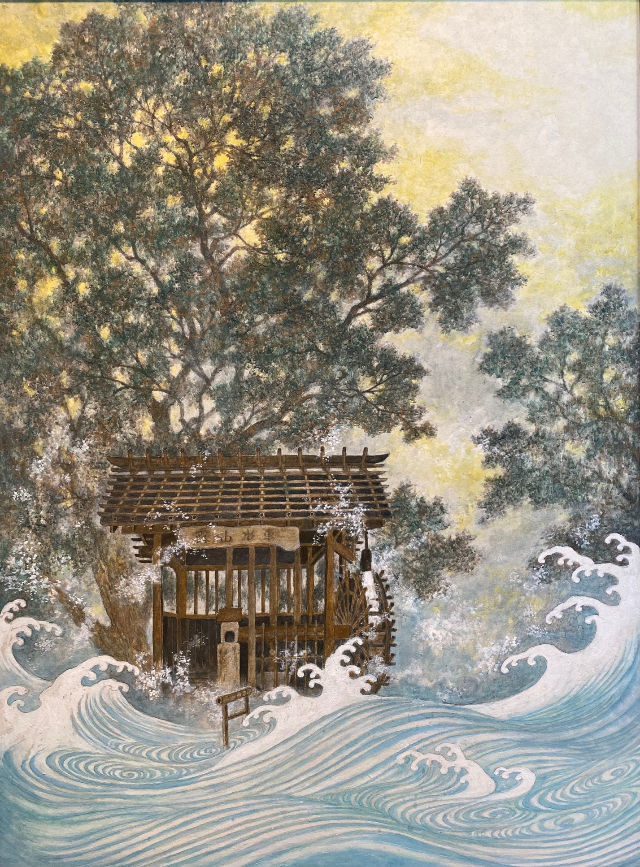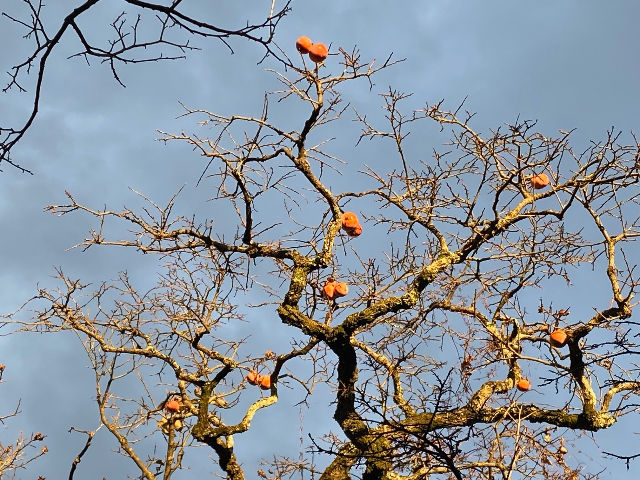GRANDMOTHERLY WISDOM – A Solstice Writing
- Rebecca Otowa
- Dec 24, 2024
- 5 min read

Very happy Winter Solstice to you! Although it will remain cold for awhile longer, we are definitely already on the upswing as far as light in morning and evening are concerned. Please check out the new winter pictures on the website.
(The picture on this blog was one painted by me in 2020, to commemorate the Year of the Wood Snake, which is next year, 2025. Happy holidays and New Year from me.)
Why “grandmotherly”? well, I heard a talk on YouTube recently in which it was said that 3 species of female animal on earth -- killer whales, elephants and humans -- experience menopause, which is followed by a considerable number of years of sexual inactivity (the doctor who was talking called it “going offline”). At the same time, females have a much higher life expectancy than males. What does this mean, according to this doctor? It means that grandmothers and wisdom, education, are evolutionarily important – passing down wisdom to the grandchildren is a function of the grandmotherly state.
Well, the interruption or decline in sexual activity is definitely an aspect of menopause in women, which men, as far as I am able to discern, don’t have – if the way older men (sometimes as old as 80 or 90) are able to father children on younger women, and the preference in men for younger, more fertile women, are anything to go by, and which are both well documented. The much-vaunted appreciation of older women for sex, as seen on shows like Grace and Frankie, I suspect is largely a fantasy thought up by men, who want to be faithful to their wives – let’s give them some credit – but also want a vibrant bed partner well after menopause. Even if they themselves are, let’s say, less capable than before. My own father, in a wheelchair in his late 70s, startled my similarly aged mother by asking her to get him some Viagra! I don’t know of any similar product for women; perhaps I am just out of the loop.
I myself was thrilled to be done with “all that”; although I had enjoyed it, I was ready to move on (much sooner than my husband), and I suspect many other women are as well. I thought this was a sign that women can handle change more easily than men, we have it built right into our biology, but apparently it’s more. It’s about giving or passing on wisdom, which is a time-honored role of the grandmother.
So, if by any chance I am viewed as an educator by my grandchildren (which is seeming less and less likely, as younger people are more and more IT-driven, and the wisdom of older people is seen as irrelevant or reactionary) what things would I like to pass on to them?
1. Don’t sweat the small stuff. In my own case this is about dirt and anything that seems gross. After living on a farm and in an old house for many years, I am intimately familiar with dirt in many forms, and with some exceptions (such as things I eat) I am not particularly worried about dirt and germs. I once taught English to a doctor who was researching the incidence of sickness in children who had been breastfed by mothers who always cleaned their nipples with disinfectant before feeding (much higher than general population!) I think that a certain amount of dirt and grossness is part of life, and we need to get used to it. If you can’t stand it, how can you have children or take your place in society?
2. Treat all things as alive. This is about respecting objects and their role in our lives. It’s about not having so much “stuff” that we are unable to respect each item. It’s also a call to acknowledge all creatures, be they plant or animal, as having the same right to exist as oneself. In a long life of being surrounded by various critters, small and large, I have learned this and never kill anything except by accident. I have various things in place that protect things I wish to protect, for example cages in which I grow veggies, to protect them from marauding deer and monkeys. If critters that are gross or dangerous – as cockroaches, centipedes or wasps (I’m still working on large spiders) cross my path, my usual reaction is just to wait for them to go away, to become invisible and go on with their life – which is also their wish.
3. This too shall pass. My favorite slogan. I use it for many things especially cold winters, unpleasant aches and pains, etc. Of course the time frame is sometimes very long, and some things won’t pass for me till after death – but we humans are very speedy and we are also aware of time, which may be seen as a liability.
4. Be patient and go more slowly. Apropos of this last one, it’s important to me to look at the big picture more often and realize that Nature moves very slowly, especially compared to human beings. Many things are taught to us if we are prepared to slow down and not be the fastest one all the time.
5. Be tolerant of yourself and others. Try not to be so competitive. Also, every person and creature is in your life for a reason, and that reason is to teach a lesson. You keep growing if you keep learning. No one ever knows it all, especially what’s inside others’ hearts and minds. Keep expanding, don’t fossilize from fear or prejudice, as you get older.
These are some things I would like to pass on. What of the things I learned from my own grandmother (maternal) whom I met intermittently until the age of 12?
1. Cooking is important. My own mother didn’t particularly like to cook, and I think it was because she didn’t like to get her hands dirty. She didn’t inherit the satisfaction of good cooking from her own mother. To know your way around a kitchen, to make a meal from what’s available, and to clean up, are important skills whether you are male or female. This I learned from watching my grandmother in the kitchen. Just as an aside, sewing is important too.
2. Put your best foot forward. This includes personal stuff like appearance. My grandmother was always well turned out in dresses, stockings and shoes, and she had beautiful white hair which she wore long and pinned up with tortoiseshell combs. My mother also subscribed to this and never would have gone out (to a place other than home) without dressing up. This idea is long gone now, but maybe it’s time for a comeback. Psychologically it is good advice too.
3. The importance of endurance. My grandmother endured many things when young – including the loss, under mysterious circumstances, of her eldest son in WWII. She also had six children, and her own mother-in-law (a houseproud German frau) was, by all accounts, a tartar. Maybe she didn’t have as much to endure as others, but she wore her burdens lightly and serenely.
Well, I’d like you also to think about the lessons you absorbed from your grandmother, as we approach the New Year and another year of life. Thanks for reading, and I hope you keep in touch next year as well.



Comments